Ten reasons why ‘The Flash’ is much more than just another superhero movie
From a highly talented (and controversial) leading actor, to a gathering of classic Batmans from different timelines, this film breaks the mold in more ways than one
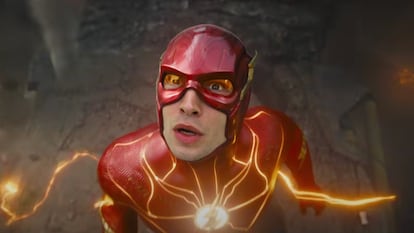
The ambitions of The Flash ($200 million budget, inspired by the comic book series Flashpoint) are a mystery. There were huge production difficulties, constant delays and, in a highly questionable decision, the world premiere was held just a couple of weeks after that of Spider-Man: Across the Spider-Verse, a brilliant and highly successful animated feature from Sony and Marvel. At a moment in which DC Comics is betting on James Gunn as the new head of its cinematographic universe, the doubts surrounding one of the latest products of the phase commanded by Zack Snyder, the previous boss, are growing. With that in mind, here are ten virtues of the amazing The Flash, a film that departs from the usual superhero movie mold (although it does have some buts).
Ezra Miller, the star, Hollywood’s new ‘enfant terrible’
Since it became a dream factory, Hollywood has been made of stories, but also of inside stories. Controversies, excesses, news stories about its stars — which sometimes lean more towards scandals than actual show business. And it is in this department where more than a superhero, Ezra Miller has proved to be a supervillain: the actor of We Need to Talk About Kevin, The Perks of Being a Wallflower and the Fantastic Beasts and Justice League sagas (already appearing as The Flash in the latter), has recently been accused of reckless driving with drug possession, assault on a fan, disturbance of public order and harassment of a couple, theft of a passport and a wallet, kidnapping and even leading a sect.
Also, Ezra Miller as the exceptional performer
In We Need to Talk About Kevin, a film that reflected on the true nature of evil, he was vileness incarnate in the young body and the perverse mind of a boy. And he was unsettling. From that point on he has alternated between independent productions and blockbusters, always displaying his virtues as well as his attractive, angular face, strange slanted eyes and undoubtedly penetrating gaze. In The Flash, he plays a double role: one, carefree, youthful and still without powers; another, professional and expansive, neurotic and nervous. Two possible Barry Allens from different points of the multiverse but united throughout much of the story, where he displays a great variety of registers, from comedy to supreme pain, not forgetting the physicality of the action. A buddy movie with two characters that are actually one.
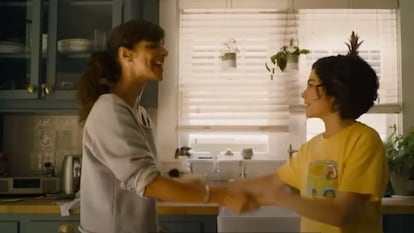
Maribel Verdú, the superhero’s mother
Nora Allen, her character, was created in 1962 by writer John Broome and cartoonist and editor Carmine Infantino for number 126 of The Flash. At that time, she was blonde and had blue eyes. The Argentine director Andy Muschietti, however, convinced the Spanish actress Maribel Verdú, who was initially reluctant to get involved in this action mess, to play the role with a very different look: as a Hispanic woman. Her time on screen is limited, but extremely important. She is the reason why The Flash does what he does; her existence drives the story and an important part of the characters. And she is superb, both in an almost comedic portrayal of customs and in a much more dramatic representation, filmed by Muschietti with beautiful close-ups that stir the emotions at key moments of the film.
Andy Muschietti, a discerning director
The first hour and a half of The Flash is outstanding. It has humor and, above all, rhythm. It presents an attractive character, establishes the conflict with conviction and gives the audience a good combination of comedy, action and drama. And there is something else, a nuance that is missing in other superhero movies, particularly in certain Marvel titles: a sense of realism in the action thanks to which the combination of everyday scenarios, people and fantasy does not seem created through CGI (it is, of course). That is to say, you don’t sense the green screen or the stage machinery behind the final product. This allows you to truly become immersed in the illusion. Muschietti, director of the terrifying movies Mama and It, shines with the fantastic sequence of the maternity hospital and the babies falling towards the rocky asphalt. A prodigy of comedy and finesse; of technical and artistic details.
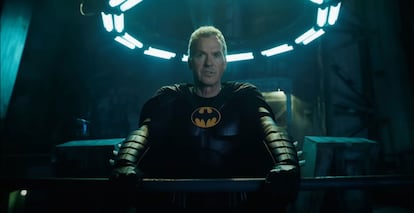
The return of Michael Keaton and Ben Affleck as Batman
In Alejandro González Iñárritu’s Birdman, a magnificent work about the artistic conscience with continuous metafictional messages (and winner of the Oscar for Best Movie), Michael Keaton is a tormented former star of superhero productions who yearns for a vain redemption as a theatrical figure thanks to a text by Raymond Carver. Keaton, the star of Batman (1989) and Batman Returns (1992), both directed by Tim Burton, dons The Dark Knight’s tight suit again at the age of 71 to close the circle of the impossibility of an (ir)reproachable artistic conscience, in addition to offering a melancholic variation in the alternate universe to which The Flash travels. The multiverse, both in Marvel and DC, is also opening the door to that: a touch of nostalgia with the return of the actors of the past, and the inevitable goosebumps that come with it. Along with Keaton, Ben Affleck reprises the role of Batman from the original timeline.
A new Supergirl with Colombian blood
In a recent interview, Barbara Muschetti, Andy’s sister and producer of The Flash, said that the Latin American audience is the demographic group that goes to the movies the most in the United States. The presence of Sasha Calle, an American actress of Colombian parents, with a physique that deviates from the fullness of the classic forms (the contrast with Gal Gadot, who becomes Wonder Woman again for this film, is striking), confirms Muschietti’s words. These are new times for superheroines.
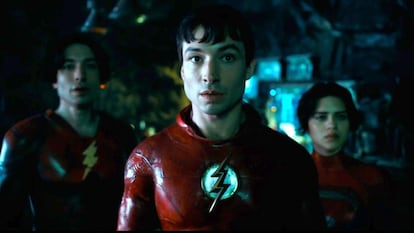
The multiverse as a bowl of pasta
Faced with the pompous, sterile and incomprehensible explanations of more than a few superhero movies about the mechanisms that drive some of their plots (here the Tesseract of Avengers: Age of Ultron could be the paradigm), Muschietti and his screenwriters, Christina Hobson and Joby Harold, strive to offer a much more enlightening explanation of what the multiverse means thanks to some spaghetti, prior to cooking and already on the plate.
The nods to popular culture
In a time travel movie in which a young Flash returns to the past to try to prevent his mother’s murder, the parallels with Back to the Future are inevitable. Knowing this, Hobson and Harold played with jubilant grace with the possibilities the multiverse offers. In this way, the historic cinematographic circumstance that the mythical film by Robert Zemeckis did not begin with Michael J. Fox as the lead, but with another actor — a much blander Eric Stoltz, replaced after five weeks of filming in which he never quite made the grade — is the perfect excuse for a few very brilliant script lines. Only for connoisseurs, true, but here even the newest viewers seem to know the ins and outs of the recent history of popular cinema. That Saoirse-Monica Jackson, from the series Derry Girls, has a small role (almost a cameo), with her characteristic shameless pose, is perfectly appropriate.
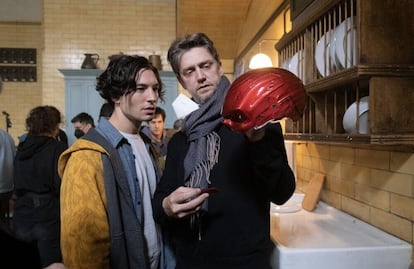
A film marked by the duality of art and life
It is not hard to imagine what went on among the crisis management teams in the offices of DC and Warner every time the ineffable Miller committed another of his misdeeds and the media reported it. According to Rolling Stone, after filming The Flash, a member of the team described him as someone “who loses his mind.” Putting everything on the scale, an interesting dilemma presents itself. First: can Miller’s behavior (he is currently in psychological treatment) affect the box office? In other words, will there be people who are reluctant to collaborate with a product starring someone accused of harassment and kidnapping? And second: if the film works, given the talent of the controversial actor, will DC continue to count on him to play Flash in upcoming titles?
Surprises for the enthusiasts
In addition to everything that can be told (things we had all already seen in the trailers), The Flash has several more surprises. They may not be enough to save a third act that is too long, somewhat confusing and much more conventional than the rest of the film, but they will surely satisfy the usual fans.
And here comes the but: the stumble of the third act
The third act of The Flash, roughly the last 40 minutes of its two and a half hours, is as routine and nondescript as many other superhero movies. In addition to being excessively long, the exhausting ending seems to forget (almost) at all times the previous effervescence in pursuit of an already too usual grandiloquence, around a villain that hardly matters at all. It is no disaster, but it doesn’t contribute anything. The strength of the film is in the first two acts.
Sign up for our weekly newsletter to get more English-language news coverage from EL PAÍS USA Edition
Tu suscripción se está usando en otro dispositivo
¿Quieres añadir otro usuario a tu suscripción?
Si continúas leyendo en este dispositivo, no se podrá leer en el otro.
FlechaTu suscripción se está usando en otro dispositivo y solo puedes acceder a EL PAÍS desde un dispositivo a la vez.
Si quieres compartir tu cuenta, cambia tu suscripción a la modalidad Premium, así podrás añadir otro usuario. Cada uno accederá con su propia cuenta de email, lo que os permitirá personalizar vuestra experiencia en EL PAÍS.
¿Tienes una suscripción de empresa? Accede aquí para contratar más cuentas.
En el caso de no saber quién está usando tu cuenta, te recomendamos cambiar tu contraseña aquí.
Si decides continuar compartiendo tu cuenta, este mensaje se mostrará en tu dispositivo y en el de la otra persona que está usando tu cuenta de forma indefinida, afectando a tu experiencia de lectura. Puedes consultar aquí los términos y condiciones de la suscripción digital.









































